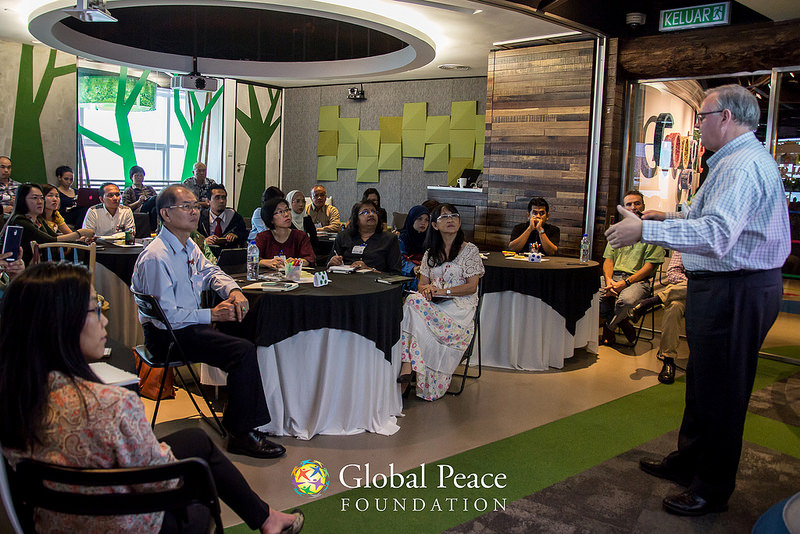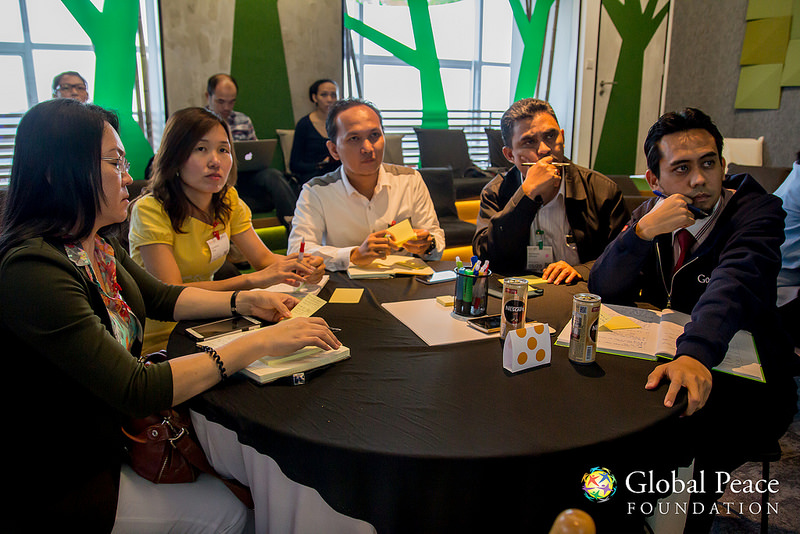“Character and Creativity is not an option, it’s a necessity.” said Dr. Tony Devine, International Vice President of Global Peace Foundation Malaysia.
“You are at the centre of it, it’s all about you,” said Dr. Tony Devine to the principal, Madam Choong and her senior assistant, Madam Lee. Global Peace Foundation is really trying to bring substantial changes, tackling issues around the world. We work with education stakeholders, teachers, ministry, parents and students, by changing the culture and the organizational culture.
Design Thinking by Steve Mansfield.
6 tools were shared during the Design Thinking Workshop, and it’s called Desire Paths, Why/How Ladder, Design Charrette, Thoughtless Acts, Analogous Thinking and Working Backwards.
The summary of the sessions ;
- Desire Paths – Intent vs actual.
- Why/How Ladder – Re-evaluate the problem – is it what you thought ?
- Design Charrette – Solution for groups of users – do the solutions conflict ?
- Thoughtless Acts – Look beyond your assumptions and ask “why” ?
- Analogous Thinking – Where else can you get ideas ?
- Working backwards – Define success and work backwards to see why…
If there is no struggle, there is no progress.
The experience…
“Everything starts with little seedlings, plant love into your students and they will feel safe and secured. As a school principal, I wanted to bring my students up into living a healthy lifestyle so I decided to demolish all the canteen stalls, and replaced it with healthy food in a homely method. The food will always be ready by 10am and it would be just in time for recess. Everything was going as planned, but sadly, I was transferred to another school. The food that were sold in my new school were horrible, but as a new principal, I was afraid to voice out my opinion as nobody would accept new ideas, but because of CCI, I started to observe, study the culture and then figure out a way to fit in and finally I decided to implement CCI into my school. Honestly, it’s really sad to see the poor students being labelled as they can’t mix around with their other friends and they were all gathered at one corner of the canteen and I told myself that this can’t go on, I have to make a change. I gathered a few mothers’, and fortunately, I got two parents and they can cook for 700 children. I told the parents to make the meals colourful. “No, our children don’t eat vegetables.” said one of the teachers, and many other teachers objected and bombarded, but I ignored them and carried on with what I needed to do to make a change. Finally, it became a success, we managed to prepare bowls for the students in order for the rich and the poor students to enjoy the food together. Now, the students don’t even have to worry about bringing pocket money. By doing this, we managed to help 103 students who was underweight, now, there are only 22 students. We go by the term, no fried food, no chemicals, no preservatives, no colouring, less salt, less sugar and less oil. “Little flies, little flies, no more food for you” was written by the students. “The students feel 0happy, they feel secure, and then ‘accidentally’ they succeeded, but it’s not an accident.” – Madam Choong.
Answers exist only through questions.
“We can’t go for all, we cannot be so ambitious. On an everyday basis, we can’t have it ‘all’ but ultimately, the goal is to have all students be more rounded which is by thinking big. The objectives and key results will be achieved if you score.” – Steve Mansfield.
To get new insights on how to implement CCI to their respective schools, the principals and teachers had to interview students…
“Muhammad Zakwan, what do you think teacher’s should do to prepare the students for their future ?” asked one of the teachers.
He then answered confidently, “The teachers should not spoon feed the students, but lead the students as they get the chance to do hands on projects. The teachers should only be a facilitator, they should let the students handle everything instead of giving them everything, because if the teachers keeps spoon feeding the students, it will leave no impact to them and they will not learn much.”
Soon after, another question was pointed out to Muhammad Zakwan by another teacher, “What is the one thing you regret not learning in secondary school ? Why ?”
He answered in despair, “English. The teachers don’t stress much on English, they would rather stick to their comfort zones which is by speaking BM than to speak English even if the subjects are in English. For example ; Chemistry, Physics and Biology. Based on my opinion, the teachers should teach in English in order to prepare students for their university life as most students ; like myself for example ; we’re afraid to speak in English because we’re afraid that people might laugh at us and I believe that something needs to be done.”









